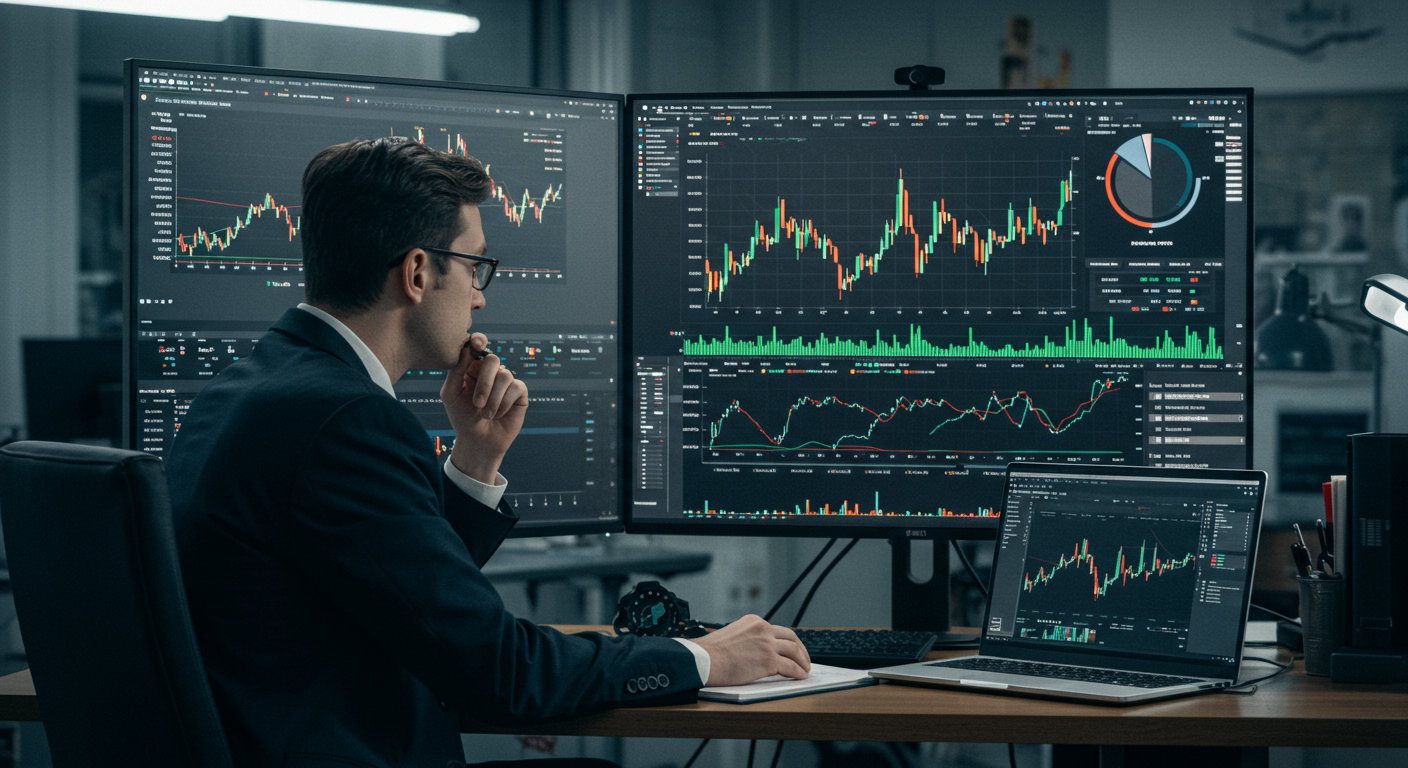Why This Got My Attention
So, I was scrolling through r/CryptoCurrency this morning, and a post immediately caught my eye: "Bitcoin OG Whale Moves 40,000 BTC To Galaxy, Triggering Market Shock." Honestly, anything involving that much Bitcoin moving around is bound to make headlines. But what really got me thinking was, what does something like this actually mean for the average trader, especially those of us trading from outside the US? It's easy to get caught up in the hype and the fear, but let's break down the practical implications. This isn't just about some rich guy shuffling his digital coins; it's about understanding market dynamics, risk management, and how to stay ahead of the curve in this crazy crypto world.
It's easy to see why this kind of news makes waves. A wallet that's been untouched since 2011 suddenly springing to life? That's the stuff of crypto legend. It conjures up images of early adopters who mined Bitcoin when it was practically worthless, now sitting on unimaginable fortunes. The sheer size of the transaction – 40,000 BTC, worth billions – is enough to make any trader sit up and pay attention. The fact that it was moved to Galaxy Digital, a well-known trading giant, adds another layer of intrigue. Is this a sign that the whale is planning to sell? Or are they simply moving their assets to a more secure platform? The uncertainty is what creates the market shock.

Here's What Happened
Okay, let's dig into the details. According to the Reddit post, this particular wallet had been dormant for over a decade. We're talking about a period when Bitcoin went from being a niche internet curiosity to a global phenomenon. During that time, the wallet accumulated 80,009 BTC. The recent transaction involved moving half of that stash – a cool 40,000 BTC – to Galaxy Digital. Now, here's the thing: moving Bitcoin doesn't automatically mean selling Bitcoin. Galaxy Digital offers a range of services, including custody solutions, trading desks, and even lending platforms. It's entirely possible that the whale is simply diversifying their holdings or seeking to generate yield on their Bitcoin.
However, the possibility of a sale is what spooks the market. When someone holds that much of a single asset, any hint of selling pressure can trigger a price drop. Think of it like this: if you're holding a relatively small amount of Bitcoin, your individual actions aren't going to move the market. But if you're sitting on billions of dollars worth, even a small percentage sold off can create a significant supply glut, driving down the price. That's why these "whale movements" are so closely watched. They're potential indicators of market sentiment and future price action. The movement to an exchange like Galaxy Digital certainly makes it easier to sell, which is part of the concern.
What This Actually Means for You
So, you're probably wondering, "Okay, that's interesting, but how does this affect me?" Well, the immediate impact is often increased volatility. When news like this breaks, you can expect to see wider price swings in Bitcoin and, potentially, in other cryptocurrencies as well. This is because traders react to the uncertainty by either selling off their positions (to avoid potential losses) or trying to front-run the whale (by anticipating a further price drop). This volatility can create both opportunities and risks. If you're a skilled trader, you might be able to capitalize on the price swings by buying low and selling high.
However, if you're new to crypto or tend to get emotional about your trades, it's best to tread carefully during periods of high volatility. Avoid making impulsive decisions based on fear or greed. Instead, stick to your trading plan and focus on the long-term fundamentals. A single whale movement shouldn't derail your overall investment strategy. It's also important to remember that the crypto market is global. What happens in one part of the world can quickly affect prices everywhere else. So, even if you're trading from a small country with relatively low trading volume, you're still exposed to these kinds of market shocks. Keep a close eye on the news and be prepared to adjust your strategy as needed.
The Stuff Nobody Talks About
Let's be real, most crypto articles focus on the potential upside – the gains, the profits, the lambos. But the truth is, crypto trading is inherently risky, and it's important to be aware of the potential downsides. In this case, the biggest risk is, of course, a significant price drop. If the whale does decide to sell a large chunk of their Bitcoin, it could trigger a cascade of selling, leading to a sharp correction in the market. This is especially concerning if you're holding leveraged positions (i.e., using borrowed funds to amplify your gains). Leverage can magnify your losses just as easily as it magnifies your profits.
Another risk to consider is the possibility of market manipulation. Whales have the power to influence prices, and some may use this power to their advantage. For example, they might spread rumors or false information to create fear and uncertainty in the market, then buy up Bitcoin at a lower price. This kind of manipulation is difficult to detect and even harder to prevent. That's why it's so important to do your own research and not rely solely on the opinions of others. Finally, remember that the crypto market is still relatively unregulated. This means that there's less protection for investors compared to traditional financial markets. If you're trading with a shady exchange or platform, you could lose your entire investment. Always do your due diligence and choose reputable platforms with strong security measures.
If You're Trading from Outside the US
Now, let's talk about the international angle. If you're trading crypto from outside the US, there are a few extra things to keep in mind. First, regulations vary widely from country to country. Some countries have embraced crypto and created clear legal frameworks for its use. Others are more cautious and have imposed strict restrictions or even outright bans. Before you start trading, it's essential to understand the laws and regulations in your jurisdiction. Failure to comply could result in fines, penalties, or even legal action.
Second, tax implications can be complex. Depending on where you live, you may be required to pay taxes on your crypto gains. The rules for calculating these taxes can be confusing, so it's best to consult with a tax professional who specializes in crypto. Third, exchange rates and fees can eat into your profits. When you're trading crypto in a foreign currency, you'll need to factor in the exchange rate between your local currency and the cryptocurrency you're trading. You'll also need to pay attention to the fees charged by the exchange, which can vary significantly. Finally, remember that access to crypto exchanges and services may be limited in some countries. Some platforms may not be available in your jurisdiction, or they may have restrictions on the types of cryptocurrencies you can trade. Always check the terms and conditions of the platform before you sign up.

Actually Doing This Stuff
Okay, so how do you actually navigate these whale-induced market shocks? Here's a step-by-step guide:
- Stay Informed: Keep a close eye on crypto news and market analysis. Follow reputable sources and be wary of rumors or unsubstantiated claims.
- Assess Your Risk Tolerance: Determine how much risk you're comfortable taking. If you're risk-averse, consider reducing your exposure to crypto during periods of high volatility.
- Diversify Your Portfolio: Don't put all your eggs in one basket. Spread your investments across different cryptocurrencies and asset classes.
- Use Stop-Loss Orders: A stop-loss order is an instruction to automatically sell your cryptocurrency if it reaches a certain price. This can help limit your losses during a market downturn.
- Avoid Leverage (If Possible): Leverage can amplify your losses, so it's best to avoid it during volatile periods.
- Don't Panic Sell: It's tempting to sell off your holdings when the market is crashing, but this is often the worst thing you can do. Stick to your long-term plan and avoid making impulsive decisions.
- Consider Stablecoins: Stablecoins are cryptocurrencies that are pegged to a stable asset, such as the US dollar. They can be a good way to preserve your capital during a market downturn. Consider Changelly for converting crypto.
- Use Reputable Exchanges: Choose reputable exchanges with strong security measures, such as KuCoin.
My Take on All This
Here's the thing: these whale movements are a normal part of the crypto market. They're going to happen, and there's not much we can do to prevent them. The key is to be prepared and to have a strategy in place for dealing with the volatility they create. Don't let fear or greed drive your decisions. Instead, focus on the long-term fundamentals and stick to your plan. I also think it's important to remember that crypto is still a relatively young and evolving market. There's a lot of uncertainty, and things can change quickly. That's why it's so important to stay informed and to be willing to adapt your strategy as needed.
Maybe I'm wrong, but I believe that Bitcoin and other cryptocurrencies have the potential to revolutionize the financial system. But it's not going to be a smooth ride. There will be ups and downs, booms and busts, and plenty of unexpected events along the way. The key to success is to stay calm, stay informed, and stay focused on the long term. And, of course, don't invest more than you can afford to lose. Crypto is a risky game, but with the right approach, it can also be a rewarding one.